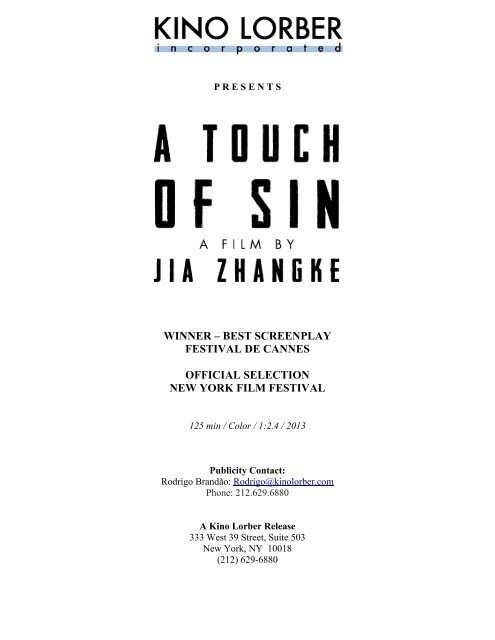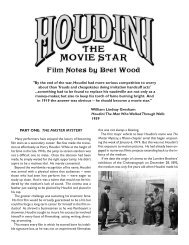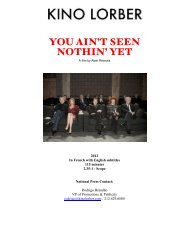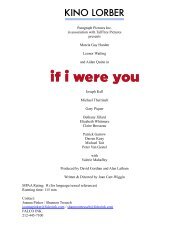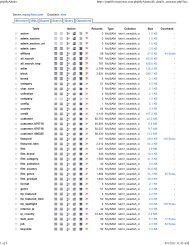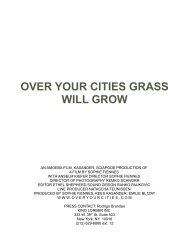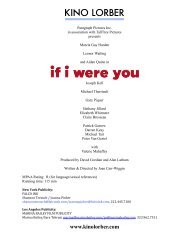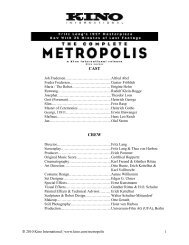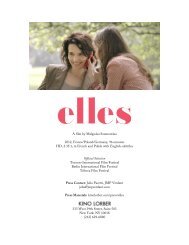Download Presskit (PDF) - Kino Lorber
Download Presskit (PDF) - Kino Lorber
Download Presskit (PDF) - Kino Lorber
Create successful ePaper yourself
Turn your PDF publications into a flip-book with our unique Google optimized e-Paper software.
P R E S E N T S<br />
WINNER – BEST SCREENPLAY<br />
FESTIVAL DE CANNES<br />
OFFICIAL SELECTION<br />
NEW YORK FILM FESTIVAL<br />
125 min / Color / 1:2.4 / 2013<br />
Publicity Contact:<br />
Rodrigo Brandão: Rodrigo@kinolorber.com<br />
Phone: 212.629.6880<br />
A <strong>Kino</strong> <strong>Lorber</strong> Release<br />
333 West 39 Street, Suite 503<br />
New York, NY 10018<br />
(212) 629-6880
CAST<br />
Xiao Yu<br />
ZHAO TAO<br />
Dahai<br />
JIANG WU<br />
Zhao San<br />
WANG BAOQIANG<br />
Xiao Hui<br />
LUO LANSHAN<br />
Co-starring<br />
ZHANG JIAYI, LI MENG<br />
CREW<br />
Written & directed by JIA ZHANGKE<br />
Associate producers<br />
KAZUMI KAWASHIRO, YUJI SADAI, LIU SHIYU, JIA BIN<br />
Co-producers<br />
EVA LAM, QIAN JIANPING, GAO XIAOJIANG, ZHANG DONG<br />
Produced by<br />
SHOZO ICHIYAMA<br />
Executive producers<br />
JIA ZHANGKE, MASAYUKI MORI, REN ZHONGLUN<br />
Director of photography<br />
YU LIKWAI<br />
Music by<br />
LIM GIONG<br />
Sound design<br />
HANG YANG<br />
Art director<br />
LIU WEIXIN<br />
Edited by<br />
MATTHIEU LACLAU, LIN XUDONG
SYNOPSIS<br />
A "brilliant exploration of violence and corruption in contemporary China" (Jon Frosch, The Atlantic),<br />
A TOUCH OF SIN was inspired by four shocking (and true) events that forced the world's fastest<br />
growing economy into a period of self-examination.<br />
Written and directed by master filmmaker Jia Zhangke (The World, Still Life), "one of the best and<br />
most important directors in the world" (Richard Brody, The New Yorker), this daring, poetic and<br />
grand-scale film focuses on four characters, each living in different provinces, who are driven to<br />
violent ends.<br />
An angry miner, enraged by widespread corruption in his village, decides to take justice into his own<br />
hands. A rootless migrant discovers the infinite possibilities of owning a firearm. A young receptionist,<br />
who dates a married man and works at a local sauna, is pushed over the edge by an abusive client. And<br />
a young factory worker goes from one discouraging job to the next, only to face increasingly degrading<br />
circumstances.<br />
DIRECTOR'S NOTE<br />
This film is about four deaths, four incidents which actually happened in China in recent years: three<br />
murders and one suicide. These incidents are well-known to people throughout China. They happened<br />
in Shanxi, Chongqing, Hubei and Guangdong - that is, from the north to the south, spanning much of<br />
the country.<br />
I wanted to use these news reports to build a comprehensive portrait of life in contemporary China.<br />
China is still changing rapidly, in a way that makes the country look more prosperous than before. But<br />
many people face personal crises because of the uneven spread of wealth across the country and the<br />
vast disparities between the rich and the poor. Individual people can be stripped of their dignity at any<br />
time. Violence is increasing. It's clear that resorting to violence is the quickest and most direct way that<br />
the weak can try to restore their lost dignity. For reasons I can't fully explain, these four individuals and<br />
the incidents they were involved in remind me of King Hu's martial arts films. I've drawn on inspiration<br />
from the martial arts genre to construct these present-day narratives.<br />
Throughout the ages, the predicaments that individuals face have changed very little - just as their<br />
responses to those predicaments have also changed very little. I also see this as a film about the<br />
sometimes hidden connections between people, that make me want to question the way our society has<br />
evolved. In this 'civilized' society that we have taken so long to evolve, what actually links one person<br />
with another?<br />
Jia Zhangke<br />
(April 2013)
INTERVIEW WITH DIRECTOR JIA ZHANGKE<br />
Violence in Chinese society is clearly the core subject of the film. Are there any specific reasons for<br />
that?<br />
When I scan the enormous amount of information posted on Weibo [Chinese equivalent to Twitter], I<br />
feel uneasy whenever I come across reports of violent incidents - incidents, that is, in which violence<br />
should have been avoided. China's breakneck speed transformation has benefitted some regions at the<br />
expense of others, and the gap between rich and poor is widening all the time. People get depressed<br />
when they're confronted by examples of enduring privilege and social injustice. Weibo aside, our<br />
society lacks channels of communication; when people don't have the habit of communicating with<br />
each other, violence becomes the fastest and most efficient way for the weak to protect their dignity.<br />
Hearing about such violent incidents makes me feel that it's necessary to face the problem of violence<br />
in a film. This is perhaps the only way that we can reduce the amount of violence in our lives. That's<br />
why I began to conceive of a film that would comprise multiple portraits of violence rather than just<br />
telling one story about one protagonist. I chose four shockingly violent news stories to present an<br />
image of contemporary China as I understand it, and used the methods of fiction to dramatize them.<br />
How much in the film's stories is invented? Did you research these incidents and try to stay close to<br />
the reported facts?<br />
Before writing the script, I visited the places where the incidents took place. I wanted to see the actual<br />
locations and to collect more information. I also conducted some interviews. This was what got me<br />
started on the project, but I didn't shy away from using elements of fiction. I think that we need fiction<br />
to reveal the social factors behind the incidents and the deep motivations of the characters. So I didn't<br />
hesitate to use fictional elements either during the writing process or during the location filming.<br />
The incidents themselves seemed very dramatic, full of conflict and contradiction. Chinese literature<br />
offered me a way of adapting them to my purpose. The tradition of the historical novel is to take one<br />
basic fact and then build characters and situations around it. While I was working on the script, I also<br />
watched a lot of traditional Chinese operas. One filmed opera in particular inspired some of the film's<br />
narrative methods: the Peking Opera Wild Boar Forest, filmed by Chen Huaikai and Cui Wei in 1962.<br />
The film's four stories are set in different parts of China, and feature a variety of regional dialects.<br />
Some of the characters are seen looking for work far from their hometowns.<br />
Is the film's geographical spread important to you?<br />
Yes, the stories take place in very different parts of China. The opening story of Dahai happens in<br />
Shanxi, where I was born, a cold, vast agricultural province in northern China. The second story<br />
happens in Chongqing, a south-western city on the Yangtze River, close to the Three Gorges. The third<br />
story takes place in Hubei, in central China. And the last story happens in Dongguan, a town in<br />
Guangdong Province, China's South coast sub-tropical "free enterprise" zone. The way that these four<br />
stories span so much of the country reminds me obliquely of traditional Chinese landscape painting.<br />
Classical painters were always trying to display panoramas of the whole country.<br />
(CONT'D)
(CONT'D)<br />
I share that aesthetic impulse, and I’d like the film to play as a flowing visual tour of China. Chinese<br />
society these days is in a phase of internal migration. People move away from their original homes in<br />
search of jobs or a better life. A lot of young people from inland areas now work in the 'international'<br />
factories in Dongguan. The flow of people has brought about new social connections. My hope is that<br />
the film shows how disparate people have hidden connections.<br />
The film captures moods of individual discontent, which take several forms. How widespread do you<br />
think these moods are in 2013?<br />
Dissatisfaction with one's circumstances is a common phenomenon. It's one of the things that drives<br />
human progress. China was cut off from much of the rest of the world for many years, and during that<br />
period collectivism prevailed. As a result, most people lacked self-consciousness. The last thirty years<br />
of reform have awakened many people to a new self-consciousness. At the same time, the last three<br />
decades have seen a pile-up of new social problems, including inequality and corruption, and these<br />
issues have not been tackled in a timely way. The accumulation of social problems and the growing<br />
awareness of personal freedom have created a climate in which we Chinese expect more and more from<br />
the country's changes.<br />
To what extent does the film refer to the wuxia genre? Your characters here take decisive actions to<br />
change their situation. Is your work taking on a sharper 'political' focus?<br />
I think of A Touch of Sin as a wuxia pian (martial arts film) about contemporary China. The wuxia<br />
genre is very popular with Chinese audiences. Many wuxia pian have a political thrust. One basic<br />
theme is repeated over and over again: an individual struggle against oppression in a harsh social<br />
environment.<br />
Most of my earlier films focus on ordinary daily life in China. Since Still Life, though, I've come to<br />
realize that some people choose extreme violent methods to change their situations. That gives me the<br />
feeling that violent revolt is not only a political issue but also a problem in human nature which is<br />
worth examining.<br />
The film features a mixture of well-known actors and non-professionals. Can you explain the<br />
thinking behind the casting?<br />
I knew from the start that it would be a film with strong dramatic action. It contains conflicts of interest<br />
between people, conflicts between people and their environments, and also characters with their own<br />
inner conflicts. As I wrote the script, I thought of various professional actors who might play these<br />
roles. Jiang Wu, who plays Dahai, has appeared in Zhang Yimou's To Live and Zhang Yang's Shower.<br />
Wang Baoqiang, who plays Zhou San, starred in Li Yang's Blind Shaft. Zhao Tao, who plays Zheng<br />
Xiaoyu, has appeared in many of my films over the years. On the other hand, the actor who plays Xiao<br />
Hui is a 19-year-old newcomer; I found him in an acting school in Hunan. I still cherish a<br />
documentary-like aesthetic. I used many non-professional actors who were cast as we shot on location<br />
right across China over a period of five months. I hope my film manages to extract dramatic excitement<br />
from the natural everyday conditions we found and filmed.<br />
(CONT'D)
(CONT'D)<br />
The English title evokes memories of King Hu's A Touch of Zen...<br />
I love King Hu's films very much. Our English title A Touch of Sin is a direct tribute to his A Touch of<br />
Zen. In our film, the story of Zheng Xiaoyu (played by Zhao Tao) and even the clothes the character<br />
wears are references to Hsu Feng in A Touch of Zen. The opera performance featured in our closing<br />
scene is called Yu Tang Chun. It's about a young woman who is framed for murder but finally wins<br />
back her freedom. It's a well-known opera in China, and, yes, King Hu directed a version of it for his<br />
second feature. I used it because I like the sense it gives that the same story can happen again and again<br />
in different times and different social conditions.<br />
I can see plenty of parallels between the pressures of survival in contemporary China and the situations<br />
in which the Chinese found themselves in earlier centuries. It's natural to me to associate this<br />
perception with works of Chinese literature and films which have broached these issues in the past. The<br />
difference for me is that I'm working in the internet age, at a time when some people own private<br />
planes, when the high-speed rail network is spreading everywhere and when people are closer to each<br />
other on Weibo than they may be in real life.<br />
That's why I wanted the four stories in the film to interweave. I want to understand how we are all<br />
evolving, to see how people 'restructure' their lives in our time, and to grasp how we form associations<br />
with each other in the world we're building.<br />
Jia Zhangke Interview by Tony Rayns, April 2013
CAST<br />
ZHAO TAO – AS XIAO YU<br />
Ms. Zhao Tao graduated from the Department of Chinese Folk Dance of Beijing Dance Academy. She<br />
obtained several awards in domestic dancing competitions and began to work with director Jia Zhangke<br />
in 2000. The film Still Life, which she starred in, won the Golden Lion Award of the 63rd Venice<br />
International Film Festival. She is also one of the producers of Jia Zhangke's documentary Useless<br />
(2007), which won the Venice Horizons Documentary Award of the 64th Venice Int'l Film Festival. In<br />
2012, as the leading actress of an Italian film Io Sono Li, she won the Best Actress Award of David di<br />
Donatello Award, the first time an Asian actress has been awarded the prize.<br />
FILMOGRAPHY<br />
2011 – IO SONO LI by Andrea Segre<br />
- Best Actress Award, David di Donatello Award<br />
- Best Actress Award, Asti International Film Festival<br />
- Best Actress Award, Bimbi Belli 2012<br />
2010 – I WISH I KNEW by Jia Zhangke<br />
2010 – TEN THOUSAND WAVES by Isaac Julien<br />
2008 – 24 CITY by Jia Zhangke<br />
2006 – STILL LIFE by Jia Zhangke<br />
2004 – THE WORLD by Jia Zhangke<br />
2002 – UNKNOWN PLEASURES by Jia Zhangke<br />
2000 – PLATFORM by Jia Zhangke<br />
JIANG WU – AS DAHAI<br />
Jiang Wu is a Chinese actor; he graduated from the department of acting of Beijing Film Academy in<br />
1994.<br />
FILMOGRAPHY<br />
2011 – LET THE BULLETS FLY by Jiang Wen<br />
2011 – WU XIA (DRAGON) by Peter Chen<br />
2010 – SNOW FLOWER AND THE SECRET FAN by Wayne Wang<br />
2010 – 1911 REVOLUTION by Jackie Chan<br />
2009 – THE ROBBERS by Yang Shupeng<br />
- Best Actor, Chinese American Film Festival 2010<br />
2000 – ZOU DAO DI by Shi Runjiu<br />
1999 – SHOWER by Zhang Yang<br />
- Best Actor, 7th Beijing College Student Film Festival<br />
- Best Actor, 5th Changchun Int'l Film Festival<br />
1997 – A BEAUTIFUL NEW WORLD by Shi Runjiu<br />
- Best Actor, 19th Hawaii
WANG BAOQIANG – AS ZHOU SAN<br />
Wang Baoqiang has received rave review since his debut role in Blind Shaft, also released by <strong>Kino</strong><br />
<strong>Lorber</strong>, in 2003. He won several international prizes for Best Actor with the film Mr. Tree.<br />
FILMOGRAPHY<br />
2013 THE ICEMAN COMETH by Wing-Cheong Law<br />
2012 LOST IN THAILAND by Xu Zheng<br />
FAIRY TALE KILLER by Danny Pang<br />
2011 MR. TREE by Han Jie<br />
- Best Actor, 9th Int'l Film Festival of Asian Pacific Counties in Vladivostok<br />
- Best Actor, 4th Asian Pacific Film Awards<br />
- Best Actor, 10th Reggio Emilia Asian Film Festival<br />
2010 LOST ON JOURNEY by Wai Man Yip<br />
FIRE OF CONSCIENCE by Dante Lam<br />
2008 THE EQUATION OF LOVE AND DEATH by Cao Baoping<br />
2007 THE ASSEMBLY by Feng Xiaogang<br />
2003 A WORLD WITHOUT THIEVES by Feng Xiaogang<br />
BLIND SHAFT by Li Yang<br />
- Best Actor, Deauville Asian Film Festival 2003<br />
- Best Actor, Golden Kinnaree Awards 2004<br />
- Best New Performer, Golden Horse Awards 2003<br />
LUO LANSHAN – AS XIAO HUI<br />
Born in 1994, Luo lives in Heng Yang, Hunan province. He studies at Hunan Mass Media Vocational<br />
College. A Touch of Sin is his debut.
PRODUCTION CREW<br />
JIA ZHANGKE – Screenwriter / Director<br />
Jia Zhangke was born in 1970 in Fenyang, Shanxi Province of China. He graduated from the Beijing<br />
Film Academy and made his first feature film Xiao Wu in 1998. He now lives in Beijing and is actively<br />
involved in the filmmaking scene in China. Still Life won the Golden Lion Award (Best Film) at the<br />
63rd Venice International Film Festival in 2006.<br />
FILMOGRAPHY<br />
2010 – I WISH I KNEW (documentary)<br />
- Un Certain Regard, 63rd Cannes Int'l Film Festival<br />
2008 – 24 CITY<br />
- In Competition, 61st Cannes Int'l Film Festival<br />
2007 – USELESS (documentary)<br />
- Venice Horizons Documentary Award, 64th Venice Int'l Film Festival<br />
2006 – STILL LIFE<br />
- Golden Lion Award, 63rd Venice Int'l Film Festival<br />
2006 – DONG (documentary)<br />
- Horizon, 63rd Venice Int'l Film Festival<br />
2004 – THE WORLD<br />
- In Competition, 61st Venice Int'l Film Festival<br />
2002 – UNKNOWN PLEASURES<br />
- In Competition, 55th Cannes Int'l Film Festival<br />
2001 – IN PUBLIC (documentary)<br />
- Grand Prix, 13th Int'l Documentary Film Festival of Marseilles<br />
2000 – PLATFORM - In Competition, 57th Venice Int'l Film Festival<br />
1998 – XIAO WU - Wolfgang Staudte Award & Netpac Award,<br />
- The International Forum of New Cinema, 48th Berlin Int'l Film Festival\
YU LIK-WAI – Cinematographer<br />
Born in 1966 in Hong Kong, Yu Lik-Wai graduated from INSAS (Institut National Superieur des Arts<br />
de Spectacle, Belgium) in 1994, majoring in cinematography (Bachelor of Fine Arts).<br />
FILMOGRAPHY AS CINEMATOGRAPHER<br />
2011 – A SIMPLE LIFE by Ann Hui<br />
2011 – LOVE AND BRUISES by Lou Ye<br />
2011 – SAUNA ON MOON by Zou Peng<br />
2010 – I WISH I KNEW by Jia Zhangke<br />
2008 – 24 CITY by Jia Zhang Ke<br />
2006 – GOING HOME by Zhang Yang<br />
2006 – STILL LIFE by Jia Zhangke<br />
- Best Cinematography, Los Angeles Film Critics Association Award<br />
2006 – POST MODERN LIFE OF AUNT by Ann Hui<br />
2004 – THE WORLD by Jia Zhangke<br />
- Best Cinematography, Las Palmas de Gran Canaria Int'l Film Festival<br />
2002 – UNKNOWN PLEASURES by Jia Zhangke<br />
2000 – PLATFORM by Jia Zhangke<br />
1998 – ORDINARY HEROES by Ann Hui<br />
1997 – XIAO WU by Jia Zhangke<br />
FILMOGRAPHY AS DIRECTOR<br />
2008 – PLASTIC CITY - In Competition, 65rd Venice Int'l Film Festival<br />
2003 – ALL TOMORROW'S PARTIES - Un Certain Regard, 56th Cannes Int'l Film Festival<br />
1999 – LOVE WILL TEAR US APART - In Competition, 52nd Cannes Int'l Film Festival<br />
1996 – NEON GODDESSES (documentary)<br />
- We Love Cinema Award, Yamagata Int'l Documentary Film Festival, Japan


